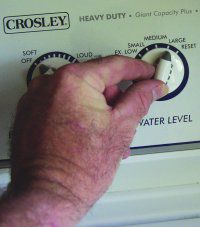| The Alliance to Save Energy recommends setting proper levels on washing machines to avoid wasting water when laundering smaller loads. |
It may read like a broken record to local residents , but the issue remains a top priority in Carbon County, Utah and the western United States.
In July 1962, Price officials announced in the Sun Advocate that the administration had made three criteria part of the city’s request for water conservation.
The officials indicated that the utmost voluntary cooperation would be required by local residents in order to avoid the necessity of implementing strict water usage restrictions throughout the remainder of the summer.
The conservation points identified by Price city officials in 1962 included the following:
•Outside watering should be done only when necessary and not just because there is time for it.
•Outside watering should be only done for short periods of time and only enough to freshen lawns and shrubs.
• Outside watering should be confined to early mornings and evenings, with watering prohibited between the hours of 9 a.m. and 6 p.m. Any watering during the heat of the day is mostly waste because of heavy evaporation.
Identical announcements could have been made during the droughts in the late 1970s or the early 1990s.
And of course, the emphasis on the need for Carbon County residents to voluntarily implement water conservation practices is certainly be applicable in connection with the current drought conditions.
The cast of characters who issue the directives may change, but the words remain basically the same.
And with the steadily increasing demand created by America’s energy and water consumptive society, the warnings are as important as ever.
The warnings and the precautions associated with how and when to use water outside have changed very little.
Officials and citizens involved with water in the West are repeating the same messages over and over again – people must conserve.
Water conservation practices are officially encouraged every summer, whether an area is in the midst of a drought year or not. But in some years, it seems like consumers are actually encouraged to use more. But not in summer 2002 and definitely not in southeastern Utah.
Some residents talking on the streets the last few days believe that the rain the area received during the week has helped to alleviate the local water problem.
But even in the areas of the Castle Valley where hard thunderstorms pounded the ground with so much rain that the water ran off in small rivers, the soil still remains extremely dry only an inch below the surface.
Summer thundershowers seldom do anything for a bad water situation, other than to keep people from having to water their lawns for an extra day or two.
By properly watering lawns and yards, residents can make the biggest impact on supplies in Carbon County.
But focusing on water conservation inside the house can also make a difference.
Many of the conservation measures people can implement to save water reduces energy consumption.
Saving energy represents another premium during the hot summer months when millions of air conditioners are toiling to keep buildings and homes cool.
The Alliance to Save Energy recently released several guidelines for in-house conservation.
Some of the alliance’s recommendations are conventional ideas. Other suggestions offered by the organization have unique, relatively unfamiliar twists.
The alliance’s conservation recommendations include:
•If homeowners are in the market for a new dishwasher or washing machine, they should look for appliances featuring the Energy Star label.
Front and some newer top loading machines with the label use significantly less water.
Dishwashers often have cycles that require less water and energy as well. Consumers should utilize the features.
•When people are using a washer or a dishwasher, they should try to operate the machines with full loads.
If less than a full load of laundry is to be done, consumers should adjust the water level on the washing machine appropriately.
People should refrain from washing all loads on the highest water level.
•Residents should install low-flow shower heads. The heads can save up to five gallons of water per minute while the shower is turned on.
People should take short showers instead of baths.
•Residents should fix drippy faucets or leaky toilets. A leaky toilet can waste up to 52,800 gallons of water per year.
Another thing that will conserve water is to put new aerators in taps. Many newer models use less water and provide more pressure.
•Residents should place a plastic bottle filled with water in toilet tanks.
People following the plastic bottle tip will save up to 11 gallons per day.
•Consumers should turn off the water while brushing teeth.
Not letting the water run can save up to four gallons per minute.
•People should try to recycle water when possible instead of letting it go down the drain.
For example, people can connect barrels to down spots to collect rain to water plants and flowers.
Moisture collected during a rainstorm can also be used to wash motor vehicles, equipment or fruits and vegetables.

